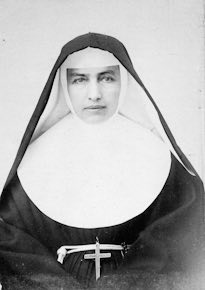Barbara Koob was born in Heppenheim, Germany. In 1839, her family immigrated to the United States and settled in Utica, NY. As soon as she completed school, she supported her family from 1853 – 1862. She then entered the Sisters of the Third Order of St. Francis in Syracuse, NY and became known as Sister Marianne. She held a variety of leadership positions in her religious community and at upstate New York schools.
In 1866, she helped found St. Elizabeth’s Hospital in Utica, NY and in 1869 became the primary founder of St. Joseph’s Hospital in Syracuse, NY: two hospitals that were among the first 50 hospitals founded in the United States. The St. Joseph’s Hospital Charter stated: “In the admittance and treatment of patients, no distinction shall be made because of theological belief, nationality or color.”
Saint Marianne became the Administrator of St. Joseph’s in 1870, a pioneering advocate for patient’s rights, sanitation and hygiene. The College of Medicine of Syracuse University was moved from Geneva, NY to Syracuse because of the training opportunities available to doctors at St. Joseph’s Hospital, and Mother Marianne admitted the medical students and initiated their clinical instruction.
In 1874, her policy was “the wishes of the patients with regard to their being brought before the medical students should be respected in every case.” Responding to an appeal from the King and Queen of Hawaii, Saint Marianne and six other Sisters of St. Francis arrived in Honolulu in late 1883. In four years, they transformed the Kakaako Branch Hospital for those with leprosy from an unsanitary institution plagued by vermin into a hospital compound with beautiful grounds and cottages, where people were treated with dignity.
In 1884, Saint Marianne founded the Malulani Hospital, the first general hospital on Maui. The next year, she founded the Kapiolani Home in Honolulu for the healthy female children of persons with leprosy, most likely the first institution of its kind in the world. In 1888, she arrived at the remote settlement on Molokai’s Kalaupapa peninsula, a desolate place where individuals of all ages challenged by leprosy had been abandoned by society. She established the Bishop Home for single women, providing a safe, affirming environment. Her influence spread to all of Kalaupapa, slowly transforming it from a place of abandonment and despair to a community of hope and dignity.
More than 130 years later, her philosophy of seeing value in every individual and promoting a “quality of life spirit”, ensuring human rights and individual dignity, belonging and community, still resonates today. Her vision that those marginalized by society be afforded opportunities and access to health care, dignity and equal treatment, is manifested in the St. Joseph Hospital Center of Syracuse, St. Elizabeth’s of Utica, in Hawaii’s St. Francis Medical System “hospital without walls”, and in the Kalaupapa National Historical Park.

